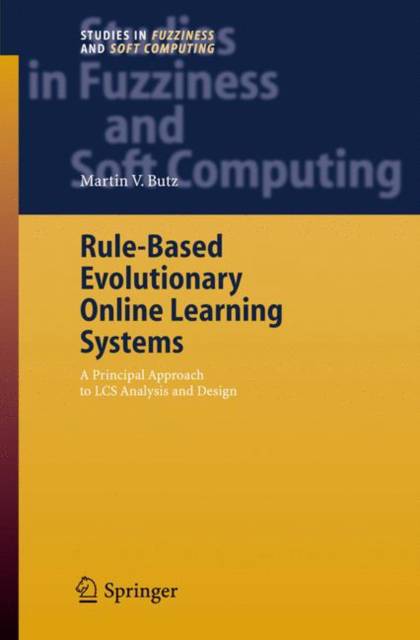
- Retrait gratuit dans votre magasin Club
- 7.000.000 titres dans notre catalogue
- Payer en toute sécurité
- Toujours un magasin près de chez vous
- Retrait gratuit dans votre magasin Club
- 7.000.000 titres dans notre catalogue
- Payer en toute sécurité
- Toujours un magasin près de chez vous
Rule-Based Evolutionary Online Learning Systems
A Principled Approach to Lcs Analysis and Design
Martin V Butz
105,45 €
+ 210 points
Format
Description
Rule-basedevolutionaryonlinelearningsystems, oftenreferredtoasMichig- style learning classi?er systems (LCSs), were proposed nearly thirty years ago (Holland, 1976; Holland, 1977) originally calling them cognitive systems. LCSs combine the strength of reinforcement learning with the generali- tion capabilities of genetic algorithms promising a ?exible, online general- ing, solely reinforcement dependent learning system. However, despite several initial successful applications of LCSs and their interesting relations with a- mal learning and cognition, understanding of the systems remained somewhat obscured. Questions concerning learning complexity or convergence remained unanswered. Performance in di?erent problem types, problem structures, c- ceptspaces, andhypothesisspacesstayednearlyunpredictable. Thisbookhas the following three major objectives: (1) to establish a facetwise theory - proachforLCSsthatpromotessystemanalysis, understanding, anddesign;(2) to analyze, evaluate, and enhance the XCS classi?er system (Wilson, 1995) by the means of the facetwise approach establishing a fundamental XCS learning theory; (3) to identify both the major advantages of an LCS-based learning approach as well as the most promising potential application areas. Achieving these three objectives leads to a rigorous understanding of LCS functioning that enables the successful application of LCSs to diverse problem types and problem domains. The quantitative analysis of XCS shows that the inter- tive, evolutionary-based online learning mechanism works machine learning competitively yielding a low-order polynomial learning complexity. Moreover, the facetwise analysis approach facilitates the successful design of more - vanced LCSs including Holland's originally envisioned cognitivesystems. Martin V.
Spécifications
Parties prenantes
- Auteur(s) :
- Editeur:
Contenu
- Nombre de pages :
- 259
- Langue:
- Anglais
- Collection :
- Tome:
- n° 191
Caractéristiques
- EAN:
- 9783540253792
- Date de parution :
- 24-11-05
- Format:
- Livre relié
- Format numérique:
- Genaaid
- Dimensions :
- 156 mm x 234 mm
- Poids :
- 585 g







